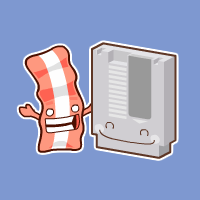 Many times in my career as a game developer I’ve heard the phrase, “how tough would it be to build our own version of this game…?”. I’ve found myself in this situation for many different reasons. Sometimes it’s driven by a client’s desire to have their own version of a specific game. Sometimes it’s a choice my company has made in order to deliver something of high quality at a low cost to our client. And sometimes I just can’t help but challenge myself to code something neat I saw or put my spin on a game I’ve grown to love.
Many times in my career as a game developer I’ve heard the phrase, “how tough would it be to build our own version of this game…?”. I’ve found myself in this situation for many different reasons. Sometimes it’s driven by a client’s desire to have their own version of a specific game. Sometimes it’s a choice my company has made in order to deliver something of high quality at a low cost to our client. And sometimes I just can’t help but challenge myself to code something neat I saw or put my spin on a game I’ve grown to love.
Whatever the case may be, it’s not unusual to wind up with the task of emulating or building on the concept of an existing game. This is especially true in the casual games space. If I see one more match 3 game I’m going to swap a bullet for my brain and hope for a big combo bonus. But since there are many reasons (all very different) you might rebuild or rework someone else’s game, I’ll hold my opinions regarding when this is appropriate and just talk about what happens once you’ve arrived at the decision to do so. In the interest of opening up on a positive note, let’s start by talking about some of the advantages.
Advantages of Working from Someone Else’s Game
- Clients are typically not very good at visualizing a concept. Having a working version of what you’re proposing helps speed the pitch and pre-production process along considerably, which will save you time and money.
…
YOU: “It’ll be a lot like this game, but with your characters instead of Mario…”
CLIENT: “Super. Here’s a small shed filled with twenties. Quit your day job and don’t disappoint me.”
YOU: “Wow, that was easy.” ;) - Having a clear picture of the final product from the start makes it much easier to estimate how long it will take you to program. Original ideas tend to evolve more than clones, because you often don’t know how a game will feel until you play it. Refining a game on the fly costs you money in the form of time. Accurate estimates usually mean higher profit margins.
- Hopefully the game you’ve chosen to emulate has already proven to be fun, which can make it easier to sell the client on it. And more often than not, clients come to the table with a game they like and want to duplicate or build upon.
…
CLIENT: “Have you played this, my kids love it!”
YOU: “Really, your kids love Turbo Tax for the iPhone. Really? reeeealllly?”
CLIENT: “As it turns out the closest thing I’ve ever come to playing a game is editing an excel spreadsheet. But let’s go with my game concept anyway. You only live, eat and breathe games. Here’s a dollar. Make me a version of Halo I can play on my watch.”
YOU: “I’m going to pee in your coffee when you leave the room.”Just make sure the game you or your client choses to emulate is within scope and isn’t a piece of garbage.
Disadvantages of Working from Someone Else’s Game
Unfortunately, these advantages come with trade-offs. As I discussed in my article, The Difference Between Tetris and “tetris”, emulating a classic is an uphill battle. If you know the game, it’s likely other gamers will too. That means as soon as they figure out who you borrowed your idea from they’ll start comparing you to the original. If your game doesn’t hold up, you’re in trouble. On top of being compared to your game’s predecessors, you open yourself up to angry users who might take exception to your tampering with a game they know and love. And by opting out of an all-together original idea your game enters the world as a follower rather than a leader or an innovator. The good news is that if you’re smart about it these disadvantages can work in your favor.
Tips that might help your clone, tribute or adaptation to be a success:
- Play the original. Beat the original. Learn the original top to bottom and then make sure you at the very least get the game mechanics right. People familiar with the original will have expectations, meet them and then some. If you make a Super Mario Bros. clone and don’t give the user a run button your users are going to be pissed, get frustrated and give up on your game.
- Figure out what frustrates you about the original. This is your opportunity to fine tune some of the things that might have made the original clunky or frustrating. Super Mario Bros. was great, but not all first runs are that well polished and even that game wasn’t perfect. If you’re copying a that didn’t allow you to restart levels as quickly as you wanted to, make sure yours does it better. Improve where there’s room for it, emulate what you loved.
- Give credit where credit is due. Gamers (and developers) appreciate a nod to the creators. It shows that you’re not trying to pass a concept off as your own, which is endearing and comforting. If you’re making a web game you’ll want to do everything you can to avoid the wrath of angry forum kiddies itching to flame content thieves. Plus it’s just plain respectful to give thanks to those who came before you. Do the right thing :)
- Gamers are a fun crowd with a sense of humor. If you can be funny and down to earth about the ideas you’re borrowing you’ll find that your game will get a much better reception. Making a game very similar to Super Mario Bros? Have the rescued princess ask you where Mario is and have your hero respond “he’s out on a call, Koopa clogged his toilet…again”. Gamers love references, easter eggs and other quirky inside jokes.
- If you’re making more than just a clone, have a hook. Make your version unique enough that it feels like its own game. I LOVE orange juice and I like vodka. When I have a screwdriver I usually just end up wishing it was orange juice and move on to a gin and tonic (keep your groans to yourself, Jack and Coke lemmings). If your version is only slightly different than the original, people are going to wish they were playing the original and resent yours. You need to add more than one new piece to your Tetris game in order to make people want to play yours instead of the original. Maybe you let your users rewind the game (a-la Braid) so they don’t have to live with their ill-fated decision to wait for that straight piece. What if the entire board, along with the gravity, could be rotated 90 degress? These kinds of changes maintain the mechanics of Tetris but create opportunities for completely different strategies to emerge.
- Be smart about who you choose to emulate. It’s probably not a good idea to take on EA Sports’ Madden series. Sometimes choosing a game to emulate also means you’re choosing an opponent. If it ends up that’s what you’re doing, pick a fight you can win or at least survive. If you can’t win, can you benefit from associating yourself with the right competition…which brings me to my next point.
- Recognize the power of generics. Drug companies know the power of this approach. They know that X number of people will always buy their name brand drugs, even though the cheaper generics are literally the same as the name brand. By selling the Walgreens brand (which is often actually made by the same company that makes the name brand and is then packaged by Walgreens) drug companies accept the fact that making a fraction of their name brand’s retail value on a generic is better than making nothing at all. So what does this have to do with games? Farmville has upwards of 80 million active monthly users. If you create a Farmville clone and expect to earn the same numbers, you’re probably setting yourself up for failure. Whether your game is better or not you’re starting 80 million users behind (is an iPod really that much better than other mp3 players?…maybe but their head start has served Apple pretty darn well.) If you instead create a Farmville clone with the expectation that you’ll get a 10% runoff from them, there’s nothing wrong with enjoying the still impressive revenue you can earn on 8 million active monthly users. The question then becomes not, “how can I do exactly what Farmville does so I can have 80 million active monthly users?” rather, “what generic version of Farmville can I offer that appeals to people who aren’t ready for Farmville but might be interested in my game/app.” (This of course assumes that you’re not trying to be better than Farmville, which is most admirable approach, but that isn’t the subject of this article) There’s nothing wrong with creating a game that feels like a widely successful game with the intention of taping into the gaming market equivalent of “swing voters”.
Certainly I’m not suggesting that it’s a good idea to go out and poach other people’s ideas. But from time to time, for whatever reason, this becomes our reality. Whether it’s our own idea, our boss’s idea or the client’s you might find yourself in that situation. When you do it’s worth your time to think about how you can use it to your advantage and what things you can do to help make it a success.
I suppose in a lot of ways this article strays from the spirit of this site, which is about making great games. Much of what’s in this article touches on the business/marketing side of making games, which isn’t really what the site is supposed to be about. As much as I’d love to just hole myself up in a room somewhere and just make great games, that isn’t always the reality of my job, though some of it is and I’m thankful for that. Regardless, repurposing games and emulating successes has been a hot subject lately so I thought I’d put some of my thoughts in writing. It’s certainly more relevant than an AT-AT made out of bacon ;)
UPDATE – 4.30.2010 – For a perfect example of someone rebuilding a game as a learning experience, read this interview with Jay Pavlina about Super Mario Crossover or my article about what makes Super Mario Crossover so impressive.
